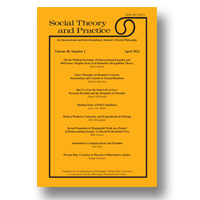|
|
|
1.
|
Social Theory and Practice:
Volume >
49 >
Issue: 4
Caleb Althorpe
What Is Meaningful Work?
abstract |
view |
rights & permissions
| cited by
This paper argues that two orthodox views of meaningful work—the subjective view and the autonomy view—are deficient. In their place is proposed the contributive view of meaningful work, which is constituted by work that is both complex and involves persons in its contributive aspect. These conditions are necessary due to the way work is inherently tied up with the idea of social contribution and the interdependencies between persons. This gives such features of the contributive view a distinct basis from those found in existent accounts of meaningful work.
|
|
|
|
|
|
|
2.
|
Social Theory and Practice:
Volume >
49 >
Issue: 4
Linda Barclay
Cognitive Disability and Social Inequality
abstract |
view |
rights & permissions
| cited by
Individuals with ‘severe’ cognitive disabilities are primarily discussed in philosophy and bioethics to determine their moral status. In this paper it is argued that theories of moral status have limited relevance to the unjust ways in which people with cognitive disabilities are routinely treated in the actual world, which largely concerns their relegation to an inferior social status. I discuss three possible relationships between moral and social status, demonstrating that determinate answers about the moral status of individuals with ‘severe’ cognitive disabilities are neither necessary nor sufficient for defending the imperative that they be treated as our social equals.
|
|
|
|
|
|
|
3.
|
Social Theory and Practice:
Volume >
49 >
Issue: 4
Maria Paola Ferretti
Fake News and the Responsibilities of Citizens
abstract |
view |
rights & permissions
| cited by
This article argues that citizens are responsible for the way they participate in political communication and debate, including for the quality of the pieces of information they post or disseminate on social media. This view contrasts with approaches that prioritise institutional responsibility in combating misleading information. Instead, in the article’s perspective, public and private institutional interventions are justified only when they aim at sustaining citizens in upholding their epistemic duties and contribute to an environment that facilitates responsible communicative exchanges.
|
|
|
|
|
|
|
4.
|
Social Theory and Practice:
Volume >
49 >
Issue: 4
Kyle G. Fritz
Understanding the Dangers of Mind Changes in Political Leadership (and How to Avoid Them)
abstract |
view |
rights & permissions
| cited by
Political leaders may change their mind about a policy, or even a significant moral issue. While genuinely changing one’s mind is not hypocritical, there are reasons to think that leaders who claim such a change are merely hypocritically pandering for political advantage. Indeed, some social science studies allegedly confirm that constituents will judge political leaders who change positions as hypocritical. Yet these studies are missing crucial details that we normally use to distinguish genuine mind changers from hollow hypocrites. These details suggest ways in which political leaders can communicate that their mind change is genuine without necessarily being judged hypocritical.
|
|
|
|
|
|
|
5.
|
Social Theory and Practice:
Volume >
49 >
Issue: 4
Corrado Fumagalli
Can Rawlsian Containment of Hateful Viewpoints Be Effective?
abstract |
view |
rights & permissions
| cited by
While most of the literature has attempted to justify harsh and soft containment given some fundamental commitments of political liberalism, I focus on how justified forms of containment can in themselves be deemed effective. This article shows that a reading of Rawls allows for a comparison of different containment practices based on their capacity to protect the stability of liberal democracies under serious threat. And, in making it possible to compare harsh and soft containment, I evaluate immediate stability gains against citizens’ judgements about their liberal democratic institutions.
|
|
|
|
|
|
|
6.
|
Social Theory and Practice:
Volume >
49 >
Issue: 4
Chris Mills
The Case for Restricted Perfectionism in Upbringing
abstract |
view |
rights & permissions
| cited by
Political liberals aim to treat citizens as free and equal participants in a society governed by principles endorsable from a wide range of reasonable conceptions of the good. This popular account of political morality struggles to accommodate child citizens yet to develop the capacities for freedom and equality enjoyed by citizens under political liberalism. It appears political liberals must either accept political liberalism should not apply to all citizens or intrusively constrain parental rights to shape the values of their children in line with anti-perfectionism. I defend a third possibility that justifies perfectionism in parenting and anti-perfectionism in education.
|
|
|
|
|
|
|
7.
|
Social Theory and Practice:
Volume >
49 >
Issue: 4
Jonathan Seglow
How Gay Is Your Cake?:
Religious Accommodation, Integrity, and Discrimination
abstract |
view |
rights & permissions
| cited by
This article examines the concept of integrity in scholarly debate on religious accommodation. There is a scholarly consensus on the value of integrity as manifesting one’s commitments (‘MM integrity’) as a way of approaching accommodation disputes, but the article argues that MM integrity is often at stake on both sides of a legal dispute. It defends a divergent view of integrity where it consists in a person’s responsible exercise of her moral and epistemic capacities in seeking to arrive at well-founded commitments (‘MR integrity’). It’s argued that MR integrity is in—sometimes productive—tension with MM integrity. These claims are illustrated by examining two recent Supreme Court cases, from the US and the UK, both of which involve bakeries accused of discriminating against gay customers
|
|
|
|
|
|
|
8.
|
Social Theory and Practice:
Volume >
49 >
Issue: 4
Referees
view |
rights & permissions
| cited by
|
|
|
|
